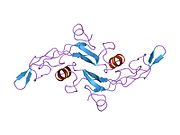TGF beta 1
Ensembl | |||||||||
|---|---|---|---|---|---|---|---|---|---|
| UniProt | |||||||||
| RefSeq (mRNA) | |||||||||
| RefSeq (protein) | |||||||||
| Location (UCSC) | Chr 19: 41.3 – 41.35 Mb | Chr 7: 25.39 – 25.4 Mb | |||||||
| PubMed search | [3] | [4] | |||||||
| View/Edit Human | View/Edit Mouse |
Transforming growth factor beta 1 or TGF-β1 is a polypeptide member of the
Function
TGF-β is a multifunctional set of peptides that controls
TGF-β3 all function through the same receptor signaling systems.[7]
TGF-β1 was first identified in human
kilodaltons with a potential role in wound healing.[8][9] It was later characterized as a large protein precursor (containing 390 amino acids) that was proteolytically processed to produce a mature peptide of 112 amino acids.[10]
TGF-β1 plays an important role in controlling the
leukocytes) secrete TGF-β1.[11]
T cells
Some
tumor necrosis factor-alpha (TNF-α), and various interleukins. It can also decrease the expression levels of cytokine receptors, such as the IL-2 receptor to down-regulate the activity of immune cells. However, TGF-β1 can also increase the expression of certain cytokines in T cells and promote their proliferation,[16] particularly if the cells are immature.[11]
B cells
TGF-β1 has similar effects on
differentiation state of the cell. It inhibits proliferation, stimulates apoptosis of B cells,[17] and controls the expression of antibody, transferrin and MHC class II proteins on immature and mature B cells.[11][17]
Myeloid cells
The effects of TGF-β1 on
TGF-β1 reduces the efficacy of the
Interactions
TGF beta 1 has been shown to
interact
with:
References
- ^ a b c GRCh38: Ensembl release 89: ENSG00000105329 – Ensembl, May 2017
- ^ a b c GRCm38: Ensembl release 89: ENSMUSG00000002603 – Ensembl, May 2017
- ^ "Human PubMed Reference:". National Center for Biotechnology Information, U.S. National Library of Medicine.
- ^ "Mouse PubMed Reference:". National Center for Biotechnology Information, U.S. National Library of Medicine.
- PMID 10631145.
- PMID 10843814.
- ^ "Entrez Gene: TGFB1 transforming growth factor, beta 1".
- PMID 6602130.
- PMID 35909816.
- S2CID 4245501.
- ^ PMID 9597127.
- S2CID 35425214.
- PMID 14645158.
- PMID 9246566.
- ^ S2CID 84309271.
- S2CID 85495400.
- ^ PMID 10611758.
- PMID 22082567.
- PMID 11418665.
- PMID 8093006.
- PMID 9675033.
- PMID 7798269.
- PMID 9813058.
- PMID 10930463.
- PMID 8235612.
- PMID 10716993.
- S2CID 84710903.
Further reading
- Border WA, Noble NA (1994). "Transforming growth factor beta in tissue fibrosis". N. Engl. J. Med. 331 (19): 1286–92. PMID 7935686.
- Munger JS, Harpel JG, Gleizes PE, Mazzieri R, Nunes I, Rifkin DB (1997). "Latent transforming growth factor-beta: structural features and mechanisms of activation". Kidney Int. 51 (5): 1376–82. PMID 9150447.
- Iozzo RV (1999). "The biology of the small leucine-rich proteoglycans. Functional network of interactive proteins". J. Biol. Chem. 274 (27): 18843–6. PMID 10383378.
- Reinhold D, Wrenger S, Kähne T, Ansorge S (1999). "HIV-1 Tat: immunosuppression via TGF-beta1 induction". Immunol. Today. 20 (8): 384–5. PMID 10431160.
- Yamada Y (2001). "Association of polymorphisms of the transforming growth factor-beta1 gene with genetic susceptibility to osteoporosis". Pharmacogenetics. 11 (9): 765–71. PMID 11740340.
- Chen W, Wahl SM (2002). "TGF-β: Receptors, Signaling Pathways and Autoimmunity". TGF-beta: receptors, signaling pathways and autoimmunity. Current Directions in Autoimmunity. Vol. 5. pp. 62–91. )
- Marone M, Bonanno G, Rutella S, Leone G, Scambia G, Pierelli L (2002). "Survival and cell cycle control in early hematopoiesis: role of bcl-2, and the cyclin dependent kinase inhibitors P27 and P21". Leuk. Lymphoma. 43 (1): 51–7. S2CID 28490341.
- Schnaper HW, Hayashida T, Hubchak SC, Poncelet AC (2003). "TGF-beta signal transduction and mesangial cell fibrogenesis". Am. J. Physiol. Renal Physiol. 284 (2): F243–52. S2CID 17046094.
- Kalluri R, Neilson EG (2003). "Epithelial-mesenchymal transition and its implications for fibrosis". J. Clin. Invest. 112 (12): 1776–84. PMID 14679171.
- Grainger DJ (2004). "Transforming growth factor beta and atherosclerosis: so far, so good for the protective cytokine hypothesis". Arterioscler. Thromb. Vasc. Biol. 24 (3): 399–404. PMID 14699019.
- Attisano L, Labbé E (2004). "TGFbeta and Wnt pathway cross-talk". Cancer Metastasis Rev. 23 (1–2): 53–61. S2CID 41685620.
- McGowan TA, Zhu Y, Sharma K (2004). "Transforming growth factor-beta: a clinical target for the treatment of diabetic nephropathy". Curr. Diab. Rep. 4 (6): 447–54. S2CID 45122439.
- Sheppard D (2005). "Integrin-mediated activation of latent transforming growth factor beta". Cancer Metastasis Rev. 24 (3): 395–402. S2CID 1929903.
- Gressner AM, Weiskirchen R (2006). "Modern pathogenetic concepts of liver fibrosis suggest stellate cells and TGF-beta as major players and therapeutic targets". J. Cell. Mol. Med. 10 (1): 76–99. PMID 16563223.
- Seoane J (2006). "Escaping from the TGFbeta anti-proliferative control". Carcinogenesis. 27 (11): 2148–56. PMID 16698802.
- Lee CG, Kang HR, Homer RJ, Chupp G, Elias JA (2006). "Transgenic modeling of transforming growth factor-beta(1): role of apoptosis in fibrosis and alveolar remodeling". Proc Am Thorac Soc. 3 (5): 418–23. PMID 16799085.
- Wahl SM (2007). "Transforming growth factor-beta: innately bipolar". Curr. Opin. Immunol. 19 (1): 55–62. PMID 17137775.
- Redondo S, Santos-Gallego CG, Tejerina T (2007). "TGF-beta1: a novel target for cardiovascular pharmacology". Cytokine Growth Factor Rev. 18 (3–4): 279–86. PMID 17485238.
- Ren H, Han R, Chen X, Liu X, Wan J, Wang L, Yang X, Wang J (May 2020). "Potential therapeutic targets for intracerebral hemorrhage-associated inflammation: An update". J Cereb Blood Flow Metab. 40 (9): 1752–1768. S2CID 218689863.
External links
- Overview of all the structural information available in the PDB for UniProt: P01137 (Transforming growth factor beta-1) at the PDBe-KB.



